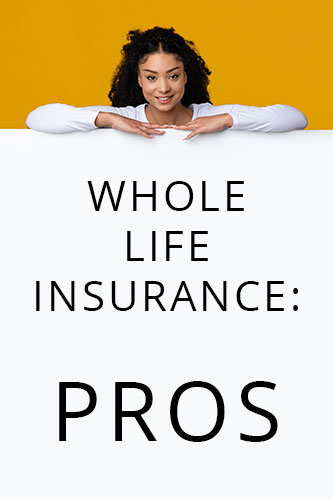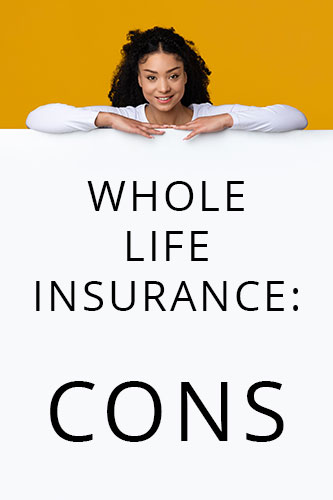
Is whole life insurance worth it? There’s no right answer for everyone – it all depends on your unique situation and financial needs. We’ll go over some of the pros and cons to help you make an educated decision. One of the biggest “pros” includes lifelong coverage you can’t outlive, while one of the biggest cons is the higher cost (compared to term life policies).
➡️ Want to ask a licensed agent “Is whole life insurance worth it?” That’s what we’re here for! Call us at 800-823-4852. Or click the button below to request a free quote.
Request a Free QuoteIs Whole Life Insurance Worth It? Consider the Pros
- Lifelong coverage. Whole life insurance covers you for the rest of your life – it doesn’t expire the way term life policies do. Most whole life policies are designed to “mature” when you’re 90 or 100 years old. If, at that point, you’re still alive, the insurance company pays you the death benefit. If you die before the policy matures, your beneficiary(ies) receive the death benefit. As long as you stay current with your payments, that death benefit is guaranteed.
- Guaranteed cash value. Every permanent life insurance policy comes with a cash value account. Part of every payment you make goes into this account. Your insurer pays interest on this cash value, which means you could have a nest egg of thousands (or tens of thousands) depending on your policy size and payment amount. It’s like a savings account attached to your policy. You have access to that money, too – via withdrawals, policy loans, or policy surrender. In most cases, cash value is “use it or lose it” and can’t be transferred to your beneficiary(ies). So it’s a great resource to use as a nest egg for retirement income, home renovation, sending kids to college, and more. The interest rates offered on whole life policies are usually low and flat, often around 1-2%. That’s not a lot, but it’s also guaranteed – so you have zero worries about the stock market tanking, interest rates diving, or any other economic catastrophe affecting that money. It’s guaranteed to grow, so it’s there when you need it.


- Tax benefits. While you can’t deduct the cost of your payments, there are two big tax benefits involved with whole life insurance. First, your cash value grows tax-deferred. That means you don’t owe any income tax on it while it’s growing. This helps it grow even faster, thanks to compound interest. If you’re pulling out cash value, you can pull up to the amount you’ve paid into your policy with zero income tax liabilities. If you pull out more than what you’ve paid in, you would owe income tax on any amount over what you’ve paid into the policy. The second tax benefit is for your loved ones. They get the policy’s death benefit 100% income-tax-free. That’s because the death benefit isn’t considered income that they’d owe tax on. It’s considered the fulfillment of a contract, which you paid for. Your loves ones won’t owe any money and will get the full face value of your policy after you pass away. (The only exception is if you structure your policy as a MEC, a strategy used by high-net-worth clients to sock away extra money – this comes with extra tax implications, but isn’t applied to virtually all of our clients.)
- Living benefits. Whole life policies come with benefits for you, too – aside from cash value. Most insurers let you dip into the death benefit if you’re diagnosed with a terminal illness, at no cost. Most insurers also offer several riders (policy add-ons) that let you use some of the death benefit if you need long-term care or are diagnosed with a chronic or critical illness. Options vary by insurer, so be sure and ask us what’s available. If you’re worried about the cost of healthcare in the future, riders can be a good way to protect against unforeseen expenses, allowing you to use some of the death benefit for treatment, travel, and more.
➡️ Want to ask a licensed life insurance agent “Is whole life insurance worth it?” That’s what we’re here for! Call us at 800-823-4852. Or click the button below to request a free quote.
Request a Free QuoteIs Whole Life Insurance Worth It? Consider the Cons
- Higher cost. There’s no getting around it – whole life (and all permanent life insurance types) cost more than term life. How much more? It depends on your age, gender, health, lifestyle factors, and policy face amount. In general, though, whole life can be anywhere from 5-10 times more expensive than term life.
- Sample term life rate: Male, age 30, non-smoker, preferred health class, Ohio, $100,000 in coverage for a 20-year term: $11-$14/month
- Sample whole life rate: Male, age 30, non-smoker, preferred health class, Ohio, $100,000 in coverage: $80-90/month
- Not an investment asset. The cash value portion of your policy is handy savings tool, but it’s not meant to function as, say, a retirement account. If you’re looking for a 5%-8% return per year, for example, whole life’s cash value won’t achieve that for you. If you’re looking for something that lets you choose where your money is invested, cash value doesn’t offer that. It’s simply a savings account credited with a flat rate of interest by your insurer. Your cash value can function as a diversified part of your overall portfolio, but don’t mistake it for an investment asset.

➡️ Want to ask one of our amazing life insurance agents “Is whole life insurance worth it?” That’s what we’re here for! Call us at 800-823-4852. Or click the button below to request a free quote.
Request a Free QuoteWhole Life vs. Term Life
Most people who ask “Is whole life insurance worth it?” are comparing whole life to a term life policy. So let’s look a few specific ways to compare them:
- Locked-in rate. The rate you pay when you buy a whole life policy is the rate you pay for the rest of your life. This makes budgeting easy – no price increases, ever. No matter what happens regarding the interest rate or inflation, your payment amount will never be affected. It’s locked in and cannot be increased. Not all forms of permanent life insurance can do this. Universal life, for example, has variable payment amounts and schedules. If that stresses you out, consider whole life – it’s much simpler and more straightforward.
- No renewals. Because you never have to renew a whole life policy, you’ll never be faced with a price increase due to your age or health. If you buy a policy at age 30 and are diagnosed with diabetes at age 40, for example, your price doesn’t change. This isn’t the case if you opt for a term life policy, outlive the term, and want to renew or buy a new policy. You’ll be charged more because you’re now older, making you a bigger risk to insure. If you’ve developed any health issues in the meantime, that will also drive the price of a new term policy higher. None of that is a problem with a whole life policy. Even if you’re diagnosed with a chronic illness a year after your policy goes into effect, the insurer cannot raise your rates. That coverage is locked in, with no renewals required, until the day you pass away.
- “Buy term and invest the difference.” You’ll see this everywhere online – financial gurus recommending you buy a cheaper term life policy instead of a whole life policy and invest the difference to make a bigger gain than you would with whole life’s cash value. And that’s the right decision for some people – but not for others. If you’re confident you’ll actually set that money aside in an investment account, awesome. But if you know you’re more likely to spend it, that can be a problem. If you’re a confident investor who’s done their homework, awesome. But no one can predict or control the stock market. What happens if your investments don’t provide the return you were looking for? If you have a higher risk tolerance, this might not bother you. But if you have a low risk tolerance, you might prefer the automatic savings and minimal but guaranteed returns from whole life’s cash value. There’s no 100% right decision here. That’s why we’re here to help if you need us!

➡️ Want to ask one of our licensed agents “Is whole life insurance worth it?” That’s what we’re here for! Call us at 800-823-4852. Or click the button below to request a free quote.
Request a Free QuoteRates valid as of 7/12/2023. Term life carriers quoted include Protective, Cincinnati, Banner Life, SBLI, American General, and Pacific Life.
